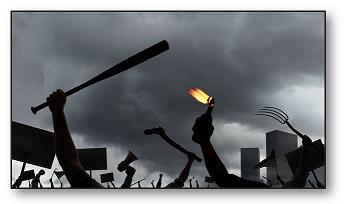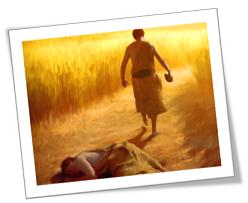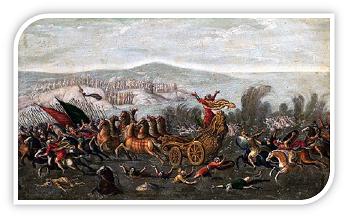Violence in the Bible
Violence in the Bible
The well-known word “hamas” is used regularly in the Bible. It is the Hebrew word for “violence”. The average reader of the Bible often has difficulty with the question why Bible texts and stories so often speak about violence. Since non-believers simply treat the Koran and the Bible as the same, it behoves us to look for a good answer...
We shall not solve “the problem” in this article. We have to be honest and admit that the Bible describes a number of matters which we do not (yet) fully understand. In this context we must keep two things in mind.
General Points⤒🔗
First, we must ensure that we do not simply apply our modern-day norms and values directly to the Bible. Instead, we should let the Bible text speak in its own language and context. Remember, for example, that the world of the Old Testament did not recognize the orderly juridical connections that we enjoy today. So it is important that we read and listen to the text patiently, with a trained ear.
Second, as we read the Bible, we must keep in mind that matters also change. In the Old Testament the continuing history of salvation concentrated specifically on the people of Israel, the people of God’s covenant, among whom he wanted to live in a “theocratic order”. In that context you cannot separate politics from divine worship, the national community from the religious community, the throne from the temple. That changes in the New Testament. In it the theme of violence is much less evident.
In addition, we must guard against a cheap contradistinction between the Old and the New Testaments. The concepts of wrath and judgment are as much in evidence in the New Testament as those of love and grace and the latter concepts do not play a lesser role in the Old Testament than in the New.
The Reality of Life←⤒🔗
The Bible in the Old Testament speaks in diverse ways about violence and this shows us that it responds very much to the reality of life. We can be thankful that our Bible does not consist just of wise sayings and pious reflections on salvation that are very remote from our daily reality. God claims not just the religious part of our life with his Word; he claims all of our life. And that life is multi-coloured, raw, and sometimes bewildering. The violence of natural disasters and the violence in society, military conflict, and politics all play a major role in that life. The Word of God does not hover above this world and outside our history, but has entered history. God’s Word wants to guide us, especially in our everyday reality, exploring that reality and giving direction. What a joy it is for the numerous people who are oppressed and trampled underfoot that the God of the Bible is not a flower power god-of-love, but that he also, indeed, especially, has something to do with violence. The question is how.
Unmasking←⤒🔗
In the literature of the nations that surrounded Israel, you come across many scenes and descriptions in which violence is simply glorified. Heroic rulers earn respect by abuse of power that shows no mercy. The more heads are cut off, the more the ruler is respected. But the atmosphere in the Old Testament is completely different. We do come across violence there, a violence that is sometimes incomprehensible to us. But it is never glorified. However, it is often unmasked. From the beginning the Old Testament warns us about violence and reveals the hidden mechanisms behind violence. The beginning of the Old Testament is striking.  It speaks of the fratricide by Cain, whom God had warned and whom he punished (Gen 4). This chapter, part of the introduction to the entire Bible, reveals the negative downward spiral of evil and violence, which God restrains. This is where we come to know human beings and we come to know God
It speaks of the fratricide by Cain, whom God had warned and whom he punished (Gen 4). This chapter, part of the introduction to the entire Bible, reveals the negative downward spiral of evil and violence, which God restrains. This is where we come to know human beings and we come to know God
Then comes the flood over the earth: a violent act of nature that stems and destroys human violence. Telling is Genesis 6:11: “Now the earth was corrupt in God’s sight and was full of violence”. Sin is violence and violence is sin. The Mosaic law contains many provisions that stem violence (see, e.g., Deut 20). The manner in which the Bible sometimes relates stories of violence holds a mirror up to the reader’s face. The book of Judges, which is full of violence, is marked by the refrain: “everyone did as he saw fit”.
Later the prophets regularly criticised Israel’s kings. For example it is well-known how Nathan gave David, the king par excellence, who founded the royal dynasty of Judah, a proper dressing-down (2 Sam 12). God, who had chosen him, prevented this same David from building God’s house, because he was a man of blood. Something like that was unheard of in the world of Near East of old.
The Old Testament makes clear that there is violence that corrupts and is thoroughly evil. But there is also violence that is liberating and is anti-violence. Before the kingdom of peace can dawn, in which the wolf will live with the lamb (Isa 11:6), justice must be done to the poor and humble and the evil of the wicked must be removed (Isa 11:4).
The Apple of God’s Eye←⤒🔗
In the Old Testament the surrounding nations constantly did violence to Israel. The concept of election remained mostly in the background. Nations attempted to destroy the people of Israel and to deny it a place under heaven: Egypt, Amalek, Assyria, Babylon.  But God made room for his people and gave them a land to live in. The most difficult texts of the Old Testament deal with it, such as the command to destroy the Canaanite nations utterly (Deut 7). It reminds us of Sodom and Gomorrah: the measure of the wickedness of the Amorites was full. What happened to the Canaanite peoples in effect anticipates the great final judgment of God on a world full of wickedness and injustice.
But God made room for his people and gave them a land to live in. The most difficult texts of the Old Testament deal with it, such as the command to destroy the Canaanite nations utterly (Deut 7). It reminds us of Sodom and Gomorrah: the measure of the wickedness of the Amorites was full. What happened to the Canaanite peoples in effect anticipates the great final judgment of God on a world full of wickedness and injustice.
And what about the psalms with all their prayers for vengeance? We must remember that these prayers are raised mostly by the righteous. They are suppressed and trampled underfoot. They no longer have recourse to justice, except by going to God. They do not take matters into their own hands but, with curses typical of the old Middle East society, they place their concerns in God’s hands.
Divine Violence←⤒🔗
Reading about the violence that God himself sometimes exercises is perhaps the most difficult for us. Indeed, the God of the Bible can perform awe-inspiring things in his wrath, things that are horrifying for people like us. But he never does it in an arbitrary and unpredictable way. He does not practice violence for the sake of violence, as the gods of the nations surrounding Israel did according to many literary texts. God is the Holy One. In one way or another his “violence” is always related to his abhorrence of evil, sin, and rebellion. His intervention frustrates the triumph of the lie. Time after time, his violence serves the restoration of justice and of peace. Precisely when the threat of God’s devastating wrath over all evil is at its greatest, the message of God’s searching love breaks through. “For his anger lasts only a moment, but his favour lasts a lifetime” (Ps 30:5). God says: “How can I give you up Ephraim? ... My heart is changed within me...” (Hos 11:8). His pronouncement of judgment is a call to repentance, an outstretched hand. It is this preaching that flourishes in the New Testament, from the manger to the cross, where the One goes to his death, so that many will live. And then the vision of the prophetic anticipation of the future begins to be fulfilled. The Bible does not preach a call to a violent conquest of the world; it preaches that the law shall go out from Zion and the word of the Lord from Jerusalem, and that the peoples will then come, sheltering in the justice of God. Then they will beat their swords into plowshares and their spears into pruning hooks (Isa 2:1-5). A powerful perspective. Christians today aim for it, as forerunners of God’s peace (Isa 11).
This article was translated by Albert H. Oosterhoff.

Add new comment